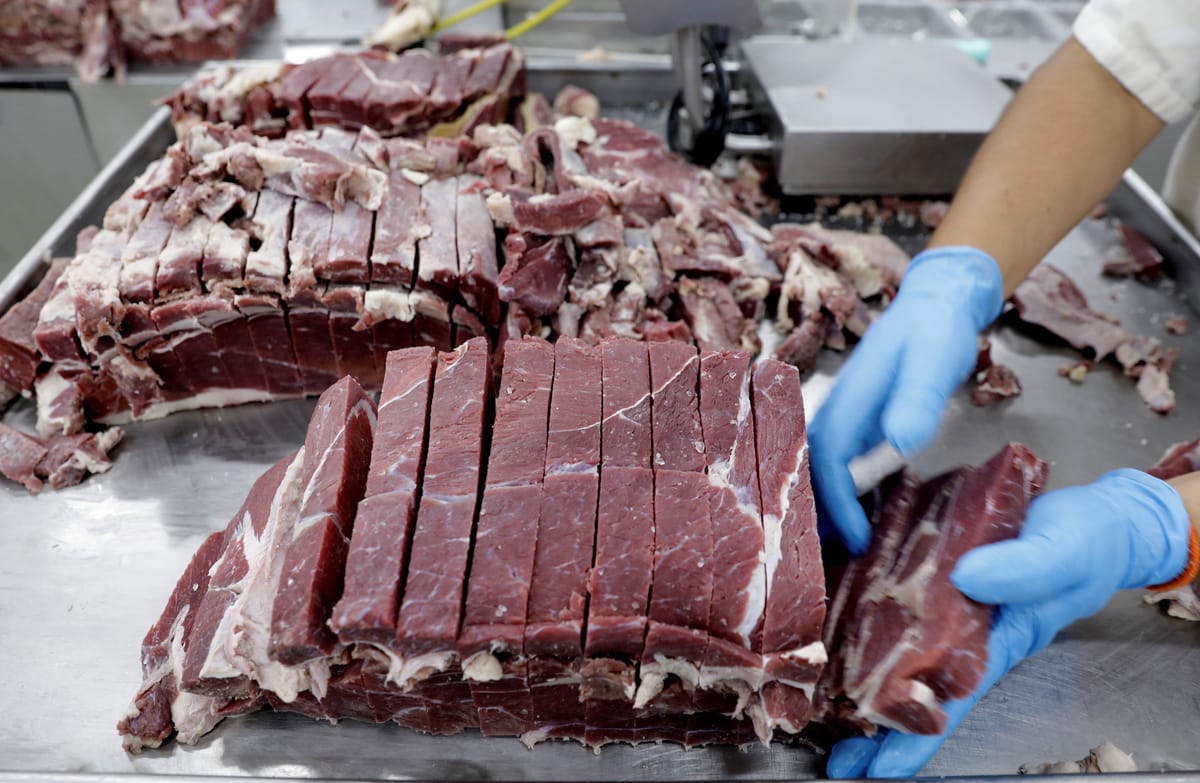UK lawmakers oppose JBS NYSE listing over social and environmental concerns
Twelve UK lawmakers are opposing meat company JBS' listing on the New York Stock Exchange.

A few minutes every morning is all you need.
Stay up to date on the world's Headlines and Human Stories. It's fun, it's factual, it's fluff-free.
The backstory: Brazilian company JBS, a big name in the global meat industry, operates worldwide from the US to New Zealand, holding the title of the world’s largest meat packer and supplier. In 2022, almost half of its earnings came from the US. When JBS made its debut on the Sao Paulo Stock Exchange in 2007, it was a big move, marking it as the first Brazilian meat packer to go public. After that, the company ventured into the US with a bunch of acquisitions, but plans for a US stock market listing hit a roadblock due to a 2017 corruption scandal in Brazil. Then, the COVID pandemic added more hurdles.
JBS believes a US listing could bring more investors and capital, so going public in on the New York Stock Exchange (NYSE) has been in the plans for years. But, there have been worries about JBS' operations and its impact on the environment, especially Amazon deforestation. JBS is the biggest buyer of cattle from the Amazon, and experts say ranching is the biggest cause of deforestation there.
More recently: Last November, JBS reported some financial troubles. It hit an 86% drop in third-quarter net income compared to the same time the previous year. The company pointed to problems in the US beef market, the US pork division getting back on its feet and too much chicken everywhere. In December, Brazilian authorities also sued JBS for its alleged involvement in buying cattle from illegally deforested land. Earlier in 2023, the company was subject to a US Senate hearing on the same topic.
The development: Twelve UK lawmakers are now opposing JBS’ listing on the NYSE, saying the company has been involved in deforestation, human rights issues and taking land from Indigenous communities. This all came out in a letter that was expected to be delivered on Wednesday to US Securities and Exchange Commission (SEC) Chair Gary Gensler.
In an email, JBS said it keeps an eye on 70,000 suppliers every day using satellites to make sure they follow social and environmental rules. The company said it also uses blockchain to check the suppliers of suppliers. It set 2025 as a deadline to eliminate deforestation from its cattle supply in the Amazon and Cerrado areas. The meat giant also announced at the recent COP28 conference that it would be participating in a Brazilian program to reach full traceability of cattle in the region.
Typically before a company gets the green light to list on the US stock exchange, SEC lawyers do a review and provide feedback, and in newer rules proposed by the agency, companies have to give more information about their environmental footprint. So we’ll have to wait and see whether this development will have a direct impact on JBS’ goals to go public in the US..
Key comments:
JBS “has a well-documented history of engaging in deforestation, violating human rights, and seizing land from Indigenous communities,” said the draft letter signed by 12 UK parliamentarians. “The company’s practices pose a significant threat to the ecosystem for global climate regulation and biodiversity conservation.”
“Anyone who values the importance of protecting our planet must see that allowing JBS’s IPO sends entirely the wrong message,” said Zac Goldsmith of Richmond Park, former minister for energy, climate and environment, who was one of the people who signed the letter. “Our focus should be on holding such entities accountable, not facilitating their financial gain.”
"A dual listing would better align JBS' corporate structure it to global peers, which we believe could be received positively by investors," said Goldman Sachs last year.
“We’ve created all the conditions for this one to be approved,” said JBS CEO Gilberto Tomazoni last year. “I’m convinced it will unlock tremendous value to the shareholder. The plan will substantially boost the company’s ability to grow and use equity as funding, he added.




Comments ()